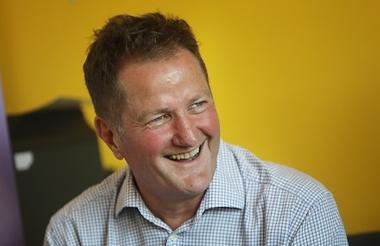Jon Sparkes joined the charity sector initially as HR director of disability charity Scope before being promoted to chief executive in 2004, a role he held for nearly six years.
After studying for a management degree at university, specialising in equal opportunities, he had worked in human resources, including as the HR director of Cambridge-based technology company the Generics Group (since rebranded as Sagentia) for seven years.
“When the opportunity came at Scope, I was quite daunted by it at a fairly young age for taking on a major chief executive role,” he says.
Since then, Sparkes has led several major charities including Crisis and UNICEF. On his experience as a charity CEO generally, Sparkes says: “I find it really hard, intellectually and emotionally, but I really enjoy it.”
Sparkes did not have a particular goal to work for a charity that supports people with a learning disability but he reflected on his childhood friendship with a boy with Down’s Syndrome when he joined Mencap last year.
“It wasn’t a causal thing, which meant I had to go and work at Mencap. But I think back to that time and my neighbour, who was the same age as me, we lived in semi-detached houses, same council estate, so our lives were identical in every way, except he had Down’s syndrome, I didn’t, and that drove such inequity.
“He ended up going to a school in a different town, and all because of that one factor. Living next door to someone with Down’s Syndrome and living at a certain relative level of poverty – it drives a real belief in social justice and equality, when you see the kind of waste of talent that comes with that.”
More broadly, he says a perception of charity sector leaders disproportionately coming from more affluent upbringings is changing and that “a good diversity of people with different backgrounds is really important”.
“You’ve got to have some empathy with your cause, even if it’s a general empathy with issues of justice and equality.
“Because we’re not just running a business that’s here to make money. We deliver services because we think we can help make people’s lives better.”
Cost pressures
Like many larger charities, Mencap has seen its costs rise recently due to the increase in employer national insurance contributions (NICs).
The charity, which recorded an income of £228m and expenditure of £226m in the year to March 2024, estimates that the NICs rise added over £5m to its costs in April this year, with the minimum wage increase adding the same amount again.
Sparkes says that while the charity expected and welcomed the minimum wage increase, up 77p to £12.21 per hour for employees over 21, it “absolutely didn’t expect the massive increase in the cost of national insurance”.
Following the announcement of the NICs and minimum wage rises in last year’s autumn budget, Mencap approached its more than 100 local authority commissioners to check whether they would adjust their fees accordingly.
“Obviously, adult social care funding is pretty tight, so we knew we would have to be really clear on the value that we add and why it was important that the new costs we were incurring were covered by our commissioners.”
Sparkes says Mencap has also cut other costs such as agency fees through better rostering, retention of staff and addressing sickness absence.
Despite these measures, Mencap has had to hand back 19 services in the past 12 months, which has led to 152 members of staff being transferred to other providers and 26 more taking redundancy.
However, Sparkes says, the charity has also been telling commissioners that it is able to take over services from other providers struggling due to financial pressures.
“If there are going to be other providers finding it difficult to deliver, we might be able to grow our services in that area because the infrastructure is there. We haven’t done much of that yet but we’re open for business.”
Prioritising fundraising
There have been other changes to Mencap’s leadership team since Sparkes joined, with three executive directors appointed to fill vacancies shortly after his arrival last year.
Sparkes also decided to promote the charity’s director of fundraising since 2019 Mary O’Hagan to his executive team permanently. While the charity gets most of its income through contracts to provide statutory services, Sparkes hopes to increase its fundraising so it can offer more of its other support for people with learning disabilities.
“I think it's fairly well known that disability isn’t the high fundraising corner of the charity sector, but every pound we can raise means we can do more work in helping people be included in their communities.
“More employment support, more helpline and advice and guidance at times when people are finding things the most difficult, more support for parents at the point of diagnosis, more policy, influencing and supporting government with evidence to make a difference. And so fundraising, absolutely has to be a priority.”
Meanwhile, the charity’s chair Carolyn Fairbairn recently announced that she would step down after three years in the role.
“She has done a remarkable job in stewarding the organisation, in our financial improvement, our service quality improvement, the development of our leadership team, and now we’re in the latter stages of developing our strategy for the coming years.
“She stewarded quite a transformation in the organisation's fortunes. She thinks it’s the right time to stand down. Personally, I wish she'd stay. But everyone has their own lives to run, and you’ll see now we’re working to identify the next person. But she has been and continues to be an absolute class act as a charity chair.”
Including people with learning disabilities
Increasing the proportion of people with a learning disability in Mencap’s workforce is a target for Sparkes.
As part of its overall 6,425-strong workforce, Mencap currently employs 222 people with a learning disability in a range of roles across the organisation.
“I would definitely like to see that increase, but not in a tokenistic way, because actually we value that experience,” says Sparkes. “There are some really, really remarkable people delivering training, but delivering training from the perspective of lived experience.”
He gives the example of Ismail Kaji, Mencap’s spokesperson in parliament, who shares first-person perspective of learning disability as well as drawing from the charity’s expertise.
“In many cases, being a person with a learning disability is almost a prerequisite for the job. How can you go in and talk to MPs about the experience of people with learning disability, unless at least someone on your team is talking about that from lived experience, not just from research and the work we do?”
One of the charity’s 10 trustees has a learning disability and it is planning to recruit a second board member with lived experience.
Mencap also has a Voices Council of 12 people with a learning disability, who support decisions made by trustees on the charity’s policies and strategies.
The charity says the Voices Council’s contributions are crucial in maintaining the integrity and focus of its work, and that the members help to minimise the negative impacts of any tough decisions Mencap makes, like handing back services.
“I meet them in the run up to our board meetings to make sure that we’ve taken on board their thinking and the chair and vice chair of the Voices Council attend our board meetings,” says Sparkes.
Mencap moved 200 employees based at its former London headquarters in 2023 as the building was sold and it has since rented office space across the capital in Spitalfields.
The decision to sell the old site followed a shift to more remote working for many head office staff as a result of the Covid-19 pandemic.
Sparkes says that the hybrid working shift has benefitted some Mencap employees but “we have to remember most people who work for Mencap don’t have the hybrid or not hybrid debate because they’re delivering hands-on support services for people in their homes”.
On his own work pattern, Sparkes says: “I don’t spend lots of time working at home.
“I’d rather be either in the office or with our services, because I do think, you know, there’s a responsibility at the top of the organisation to recognise that most people actually do have to go to the workplace every day.”
AI opportunities
As many charities grapple with the potential risks and opportunities of artificial intelligence (AI), Mencap created over 50 apprenticeships for its current staff through a new data academy last September.
Sparkes says there are three prerequisites for making the most of AI.
“The prerequisites are making sure your data is good, because if you’re going to let AI run across your data, you’re going to come to the wrong conclusions.
“If your data isn’t good, your basic systems need to be good, because I don’t want the technical infrastructure of the organisation toppling over as we put more and more pressure on it, and your skills and culture need to be good and ready for it.
“So we’re working hard on all three of those things while looking, while keeping a really clear view on where the potential is.
“Whether it’s in how we run our organisation and the efficiencies around that, whether it’s in what we actually deliver, and the impact that AI can have for people with a learning disability, is something that is going to be exciting for us as we develop our new strategy.”
Related articles












